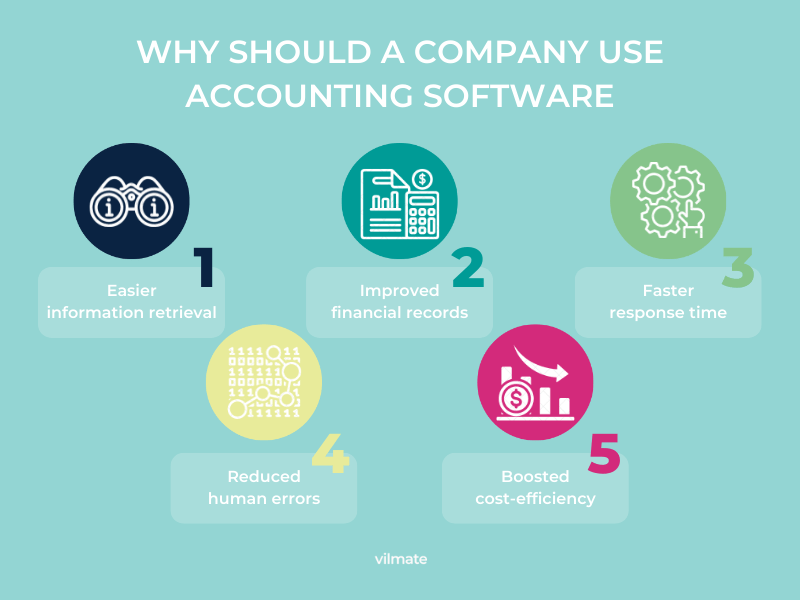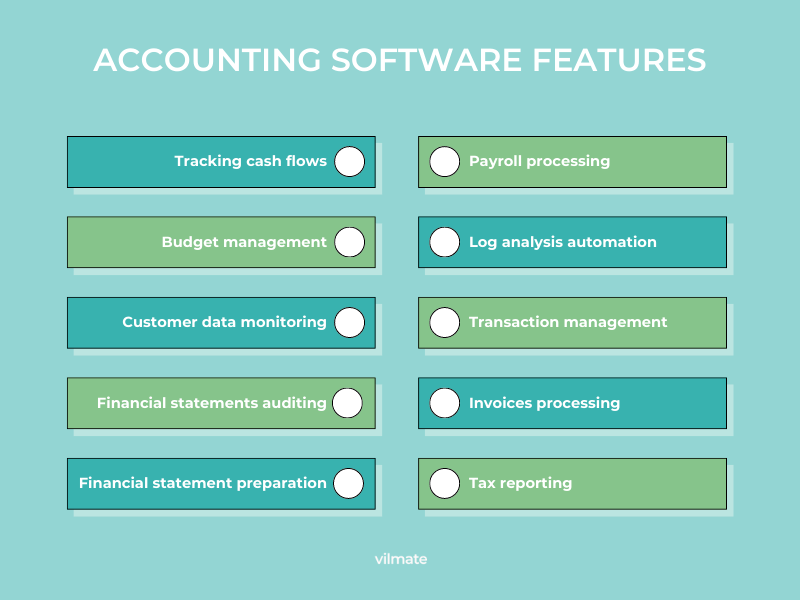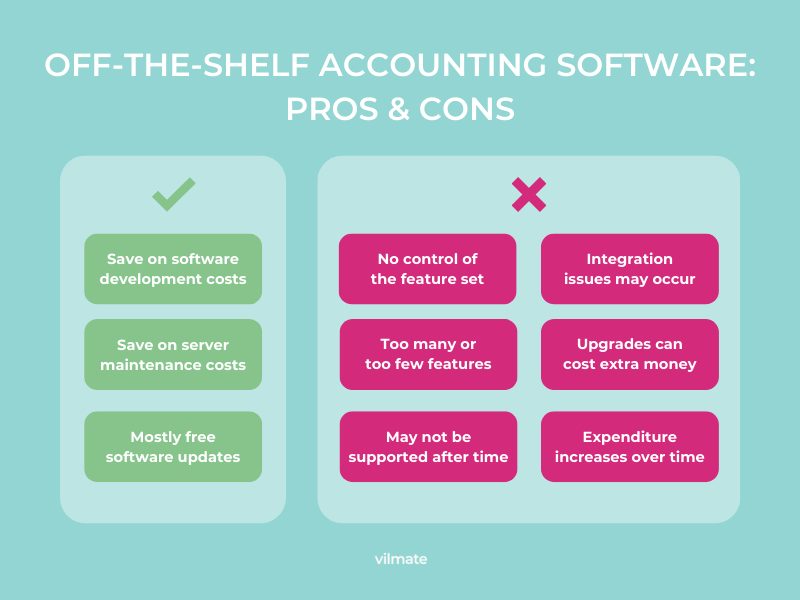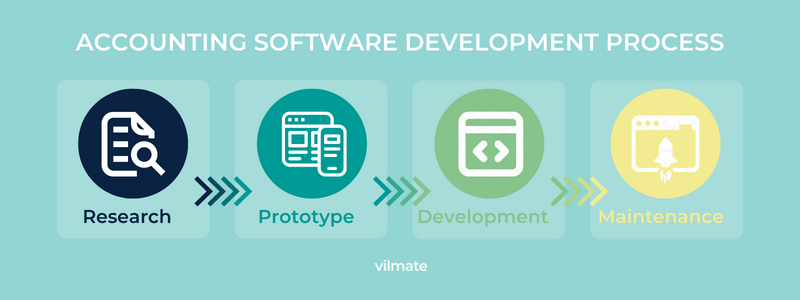In 2022, if you want your business to succeed, personal accounting software is a must-have. It’s one of the key decisions that will eventually provide you with better financial performance and expense management. Anyone will enjoy working for and with you.
Most companies don’t feel comfortable investing money in creating accounting software projects. But such an investment will turn out as fruitful as training your employees to become more efficient and productive.
Before automating any financial operations, let’s try to answer the question of how to create an accounting software program.
Why should a company use or build accounting software?
Different kinds of companies can benefit in many ways from adopting accounting software. The following advantages of utilizing and managing web-based accounting solutions include improving your income statement, cash flow reporting, asset inventory management, and optimizing your financial operations.

1. Easier information retrieval process
Since the source of all financial information is a part of the overall accounting, by using custom accounting systems, one can easily link any upcoming data.
So, developing online accounting software will help prevent situations when the business can’t find the necessary information. Moreover, the need for traditional paper-based methods can be easily eliminated.
2. Improved financial statement coverage and revenue visibility
Adding a static and graphical data source to the custom accounting system will help enable a more accurate financial statement coverage. A visible accounting system allows users to collaborate on a new level of productivity for achieving common financial goals. Users are provided with more information and the ability to control the data flow.
3. Faster response time and automation
It is one of the most significant automated accounting systems’ advantages. It comes from embracing automation processes and, as a result, improving internal efficiency and promoting more precise timings.
Automation saves time. But to achieve it, accounting software developers must be up to date with the latest technologies. Make sure that you stay ahead of the competition and make the most of the new technologies to enhance the efficiency of your business. The outcome is that a company will be able to do more with less.
4. Less human error possibility
Although you will need a team of tech professionals to set up a cash flow management system for you, almost no specialist skills are required to handle it successfully. When your accounting software development process is over, the best-case scenario is that the system will be able to eliminate or at least significantly reduce your company’s chance of error-related losses. Calculation accuracy, for instance, can be substantially improved as a result of the full-service in-house accounting software development.
5. Reduced costs
Businesses’ accounting costs may be significantly reduced by utilizing web-based accounting software. Web-based systems not only allow for greater efficiencies in document processing and reconciliation, they can also eliminate paper filing and accrual processing costs.
This is mostly due to the harmonization of responsibilities. Having a unified accounting business software solution means making things well-organized and solving the problem of being overwhelmed with a flow of information from multiple entities.
How accounting software works
Business accounting software is a tool for tracking. Sales, profits, cash flow and reserves, credit allocation, and financial statements are the targets.
Similar to financial management software, accounting software is designed to provide a way for individuals and organizations to keep track of the relevant information. It usually includes money circulation, property, stock, and related financial data.
While there are different ways of calculating, most accounting software programs have a database of these assets. Such databases are extremely useful for financial management professionals. Even though not every organization can afford this level of technological sophistication, such an investment is likely to be repaid a hundredfold.
In any case, there is an option of creating customized accounting software for both small and large businesses. It will secure business operations and enhance business accounting significantly.

Customized software or an accounting app integrates all aspects of cash flow management for you. It will reduce the complexity of cash management, thereby increasing the overall efficiency.
What you need to know about accounting software
When resolved to build accounting software, you should consider all the possible options. It’s important to choose the right solution that will comply with all your requirements and benefit your business characteristics.
Generally, they’re the size, scale, and complexity of your business. Thus, you can choose a ready-made software program or design your own accounting software architecture.
Off-the-shelf accounting systems
There are free and paid accounting software programs for you to pick.
Normally, an off-the-shelf accounting system is a ready-made product that comes with pre-configured features and a setup wizard. Chron, an authoritative portal for small businesses, recommends not to get intimidated by the process of setting up.
This solution is perfect for companies that don’t want to expend their internal resources on building software from scratch. A solution is provided by a third party and is capable of meeting the majority of your business requirements.

The advantages of buying an off-the-rack accounting solution include:
- No need to expend the resources on designing, developing, testing, and supporting the software
- A software vendor maintains servers and supporting hardware
- A software provider usually incorporates minimum functionality necessary
- Mostly free updates - ranging from full new features, bug fixes, and enhancements, to additions and improvements to existing functionality
On the other hand, the disadvantages of buying a ready-made accounting business software solution cover the following aspects:
- No control of the feature set
- No standout features to compete agains rivals
- No continuous support
- No balance in the quantity of features and functions
- No transparent integration
So if you see that your accounting workflow is too sophisticated for a ready-made solution, it’s time to think about building software from scratch. Let’s look through the main steps that the development process usually involves.
The 4 main steps of custom accounting software development
What should you begin with to achieve the benefits of custom accounting software?
This process consists of four steps.

1. Profound Research
As creating accounting software is aimed at solving the problems and dealing with the challenges that a particular business encounters, the software development process has to start with the in-depth research phase. At this stage, an accounting software development company has to collect the background information on the client and get a comprehensive explanation of the customer’s needs and priorities.
Prior to developing accounting software, the project team should focus on the methodology, business issues, and challenges that the client struggles with. The typical solution roadmap and alternatives, the company’s current needs and objectives, the market and accounting software design trends, alongside the future plans and objectives, can’t be omitted as well.
2. Building a prototype
At the stage of prototype app development, you should answer the question on the accounting software design.
In other words, you develop an idea of what your custom accounting platform should be like. But before you get down to coding, take your time to realize the features that will provide the core benefits of custom accounting software.
Create a model of a future product and validate the ideas that you’re coming up with. Next, see how effectively they can solve a customer’s problems.
This stage inevitably involves close cooperation between the client and the app development team. The project team not only ideates but also negotiates the development plan modifying the model of the product at hand.
3. Actual development and hosting
When the prototype of your bookkeeping software program is ready, the assigned accounting software developers get to work. The initial design is gradually becoming a functioning system.
One of the critical decisions to be made is where to host your custom accounting software.
- On-premises solutions
This type of hosting is very popular but requires additional costs and infrastructure for managing the software. When choosing on-premises hosting, consider that many on-premises solutions are more expensive and harder to upgrade than cloud-based solutions. On-premises solutions are also at risk of exposing unsecured databases. That’s why many potential IT partners consider this option less attractive than cloud-based solutions.
- Web-based accounting software
It means that there are web hosts providing space on a server owned or leased for use by other companies. The software must be distributed on the remote server, and the hosting company offers billing services for it. Web-based accounting software gives clients more flexibility than software hosted on-premises, allowing it to be configured more freely and keeping it up-to-date more eagerly.
- Cloud hosting
This choice fits better to small businesses with few or no on-premises environments. Thus, hosted software is provided as a service that eliminates the need for expensive infrastructure investments. SaaS accounting software for small businesses can provide much better scalability and flexibility for the operating of accounting programs. Moreover, working on cloud-based software, a web development team won’t be limited by rigid pre-configured processes.
Once the type of hosting is chosen, the coding for accounting software continues. The team writes the code, performs tests, and prepares the program for a public release.
4. Release and maintenance
Following the accounting software release, it is essential to monitor the market for any failure indicators and web development trends.
Moving your project from a small-scale custom software product to actual industrial usage is challenging. However, having attained the commitment, maintaining the system and keeping it up to date with the evolving requirements will be relatively easy.
And now, the most interesting part. To what extent you’ll have to ease your pocket to enjoy all the benefits of a unique, freshly-made accounting system.
How much does the accounting software cost
These are the questions you should answer to find out what price range your future software falls into:
- How many features, in addition to the basic ones, would you like to build?
- What are these features?
- What size is your company?
- How many users will the system have to support?
- Are you going to scale up in the future?
- Is it going to be a fixed-price project? Time & Material?
- Where will your software be hosted?
- What are the corresponding security measures?
- Do your employees need some hands-on training before you start using the software?
- What is the estimated scope of the software maintenance effort?
An Eastern European outsourcing software development company like Vilmate, at an average rate of $50 per hour, will consider all the requirements and build accounting software for you. So, depending on the feature set, the level of complexity, the number of users, and other criteria mentioned above, the accounting software development costs may range from $1,250 to as much as $625,000.
Conclusion
Custom accounting software undoubtedly has the potential to become an incremental part of your company’s toolset that automates processes and optimizes your workflow.
We hope that we’ve managed to answer at least some of your questions on how to create an accounting software product for your business needs. A multifunctional accounting app or a custom accounting platform is a feasible task for the team of Vilmate to handle.
If you want to build accounting software and don’t know where to start, check our Technologies and Services offers. It will help you make up your mind on the scale and functionality of your accounting tool and set the ground for further development of accounting software.
Stay tuned with Vilmate! And contact us any time of the day. The answer won’t take long :)





